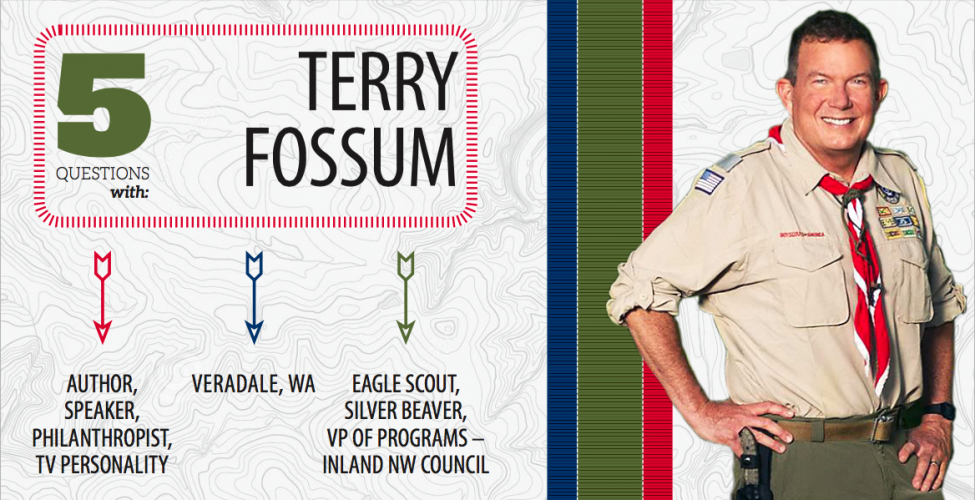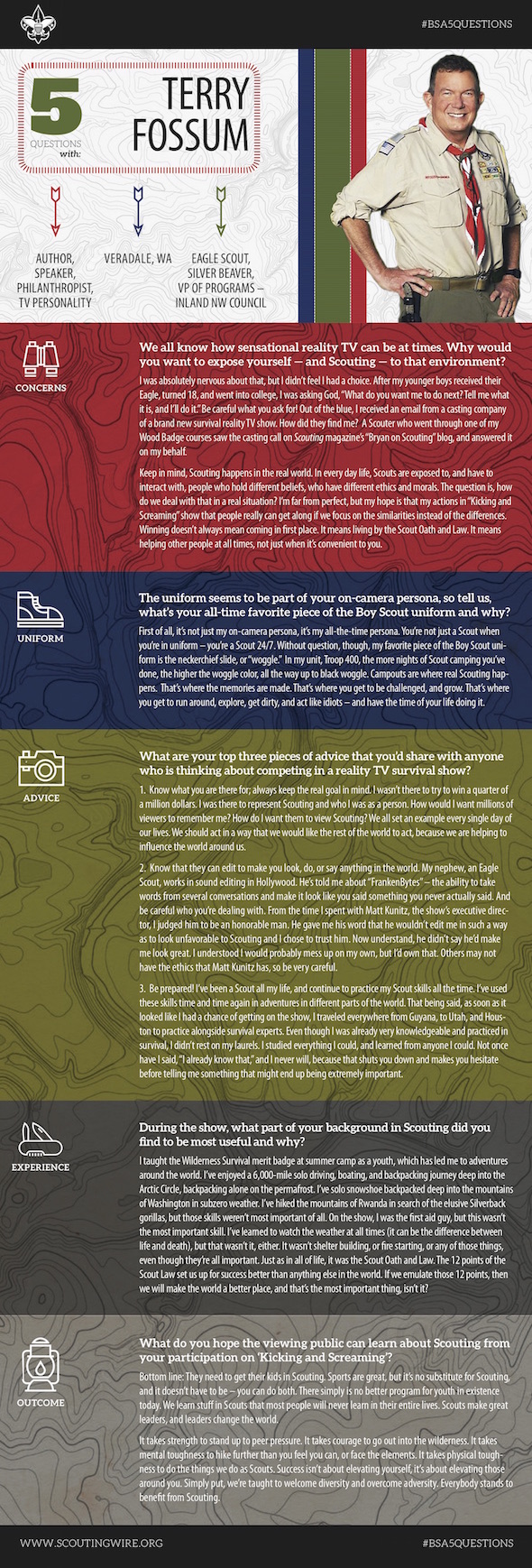
5 Questions with Kicking & Screaming’s Terry Fossum
If you’ve been keeping up with what’s coming to television this spring, you’ve probably heard about the latest outdoor survival show, Kicking & Screaming (Fox). You may have also heard one of the reality show’s participants is Scouting’s very own Terry Fossum, a regarded author, speaker, philanthropist, and Scouter.
Sure, you already know he’s got a leg up on the competition but how much do you know about Terry’s adventures? Keep reading to get his take on Scouting, survival, and reality TV.
Get to know the the Scouter behind the uniform in the infographic below, then check out the show’s premier on Fox tomorrow at 9/8 p.m. Eastern to find out if Terry’s Scouting know-how really does give him an edge when it comes to a little friendly competition in the great outdoors!

We all know how sensational reality TV can be at times. Why would you want to expose yourself—and Scouting— to that environment?
I was absolutely nervous about that, but I didn’t feel I had a choice. After my younger boys received their Eagle, turned 18, and went into college, I was asking God “What do you want me to do next? Tell me what it is, and I’ll do it.” Be careful what you ask for! Out of the blue, I received an email from a casting company of a brand new survival reality TV show. How did they find me? A Scouter who went through one of my Wood Badge courses saw the casting call on Bryan on Scouting, and answered it on my behalf.
Keep in mind, Scouting happens in the real world. In every day life, Scouts are exposed to, and have to interact with people who hold different beliefs, who have different ethics and morals. The question is, how do we deal with that in a real situation? I’m far from perfect, but my hope is that my actions in Kicking and Screaming show that people really can get along if we focus on the similarities instead of the differences. ‘Winning’ doesn’t always mean coming in first place. It means living by the Scout Oath and Law. It means helping other people at all times, not just when it’s convenient to you.
The uniform seems to be part of your on-camera persona, so tell us, what’s your all-time favorite piece of the Boy Scout uniform and why?
First of all, it’s not just my on-camera persona, it’s my all-the-time persona. You’re not just a Scout when you’re in uniform, you’re a Scout 24/7.
Without question, my favorite piece of the Boy Scout uniform is the neckerchief slide, or, ‘woggle’. In Troop 400, the more nights of Scout camping you’ve done, the higher the ‘woggle’ color, all the way up to ‘black woggle’. Campouts are where real Scouting happens. That’s where the memories are made. That’s where you get to be challenged, and grow. That’s where you get to run around, explore, get dirty, and act like idiots—and have the time of your life doing it.
What are your top three pieces of advice that you’d share with anyone who is thinking about competing in a reality TV survival show?
1. Know what you are there for; always keep the real goal in mind. I wasn’t there to try to win a quarter of a million dollars. I was there to represent Scouting and who I was as a person. How would I want millions of viewers to remember me? How do I want them to view Scouting? We all set an example every single day of our lives. We should act in a way that you would like the rest of the world to act, because you are helping to influence the world around you.
2. Know that they can edit to make you look, do, or say anything in the world. My nephew, an Eagle Scout, works in sound editing in Hollywood. He’s told me about “FrankenBytes”—the ability to take words from several conversations and make it look like you said something you never actually said. And be careful who you’re dealing with. From the time I spent with Matt Kunitz, the show’s executive director, I judged him to be an honorable man. He gave me his word that he wouldn’t edit me in such a way as to look unfavorable to Scouting and I chose to trust him. Now understand, he didn’t say he’d make me look great. I understood I would probably mess up on my own, but I’d own that. Others may not have the ethics that Matt Kunitz has, so be very careful.
3. Be prepared! I’ve been a Scout all my life, and continue to practice my Scout skills all the time. I’ve used these skills time and time again in adventures in different parts of the world. That being said, as soon as it looked like I had a chance of getting on the show, I traveled everywhere from Guyana, to Utah and Houston to practice alongside survival experts. Even though I was already very knowledgeable and practiced in survival, I didn’t rest on my laurels. I studied everything I could, and learned from anyone I could. Not once have I said, “I already know that,” and I never will, because that shuts you down and makes you hesitate before telling me something that might end up being extremely important.
During the show, what part of your background in Scouting did you find to be most useful and why?
I taught the Wilderness Survival merit badge at summer camp as a youth, which has led me to adventures around the world. I’ve enjoyed a 6,000-mile solo driving, boating, and backpacking journey deep into the Arctic Circle, backpacking alone on the permafrost. I’ve solo snowshoe backpacked deep into the mountains of Washington in subzero weather. I’ve hiked the mountains of Rwanda in search of the elusive Silverback Gorillas, but those skills weren’t most important of all. On the show, I was the first aid guy, but this wasn’t the most important skill. I’ve learned to watch the weather at all times (it can be the difference between life and death), but that wasn’t it, either. It wasn’t shelter building, or fire starting, or any of those things, even though they’re all important. Just as in all of life, it was the Scout Oath and Law. The 12 points of the Scout Law set us up for success better than anything else in the world. If we emulate those 12 points, then we will make the world a better place, and that’s the most important thing, isn’t it?
What do you hope the viewing public can learn about Scouting from your participation on Kicking and Screaming?
Bottom line: They need to get their kids in Scouting. Sports are great, but it’s no substitute for Scouting, and it doesn’t have to be. You can do both. There simply is no better program for youth in existence today.
We learn stuff in Scouts that most people will never learn in their entire lives. Scouts make great leaders, and leaders change the world.
It takes strength to stand up to peer pressure. It takes courage to go out into the wilderness. It takes mental toughness to hike further than you feel you can, or face the elements. It takes physical toughness to do the things we do as Scouts. Success isn’t about elevating yourself, it’s about elevating those around you. Scouting teaches you how to work with other people, even if those people are different than you. Simply put, we’re taught to welcome diversity and overcome adversity. Everybody stands to benefit from Scouting.
BONUS:Was there any one thing you did in all of your Scouting experience that best helped to prepare you for competing on a show like this?
Absolutely—the Reyado program at Philmont Scout Ranch. Think about it: three intense weeks of learning wilderness backpacking, navigation techniques, communication and group dynamics, advanced backcountry cooking, wilderness stewardship, and backcountry first aid and emergency procedures. That sounds a lot like what we did on the show, doesn’t it? I did this when I was 16 and it stuck with me all of my life. You never know when the lessons you learn in Scouting will come in handy. Actually, you do—every single day of your life.
You can learn more about Terry and his adventures, get inside information about the show, and connect with him on social media at www.TerryLFossum.com. Also, be sure to look out for Terry’s book, Summer Camp to Survival Show, which tells the story of how Scouting helped shape his life (available for preorder here).
Don’t forget to tune in to Fox tomorrow night on Fox at 8/9 Central to see how Terry uses his Scouting skills to tackle the wilderness challenges of Kicking and Screaming!
Save 5 Questions
Save the 5 Questions infographic and then share with your Scouting network on social media using #BSA5Questions!
You can also get to know our previous 5 Questions Scouters by checking out features on our new National Commissioner, Chief Diversity Officer, Scoutbook Team Lead and Product Owner, Director of Health and Safety, and Directors of STEM Programs. Know a Scouter who should be in the next 5 Questions? Comment with your suggestions below!



